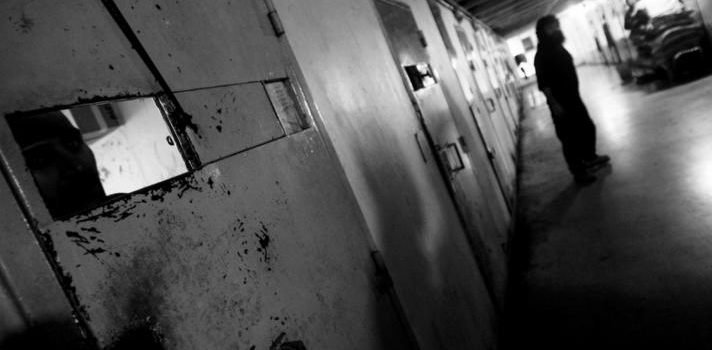Lebanese Prisons
A Syrian, Stateless, and Senseless Detention
September 17, 2021

Artwork: Courtesy of Haitham Moussawi
In August 2021, just over a year after the Beirut Port blast, a fuel tanker exploded during a dispute over smuggled fuel in Al Talil in Akkar, Northern Lebanon. The explosion, which led to the death of at least 33 citizens and tens of injuries, fueled the anger of Lebanese activists and inhabitants of the town.
Individuals went to the house of the fuel tanker owner and set it on fire, and the houses of Prime Minister Najib Mikati and an MP were also stormed. The activists’ action is not without a reason. For months, Lebanon has been suffering a shortage of fuel supply, frequent electricity cut offs, lack of medicines and basic goods, in addition to an unprecedented inflation of prices. These economic difficulties have also been accompanied by a black market that crystalizes social inequalities and provides a ground for communal unrest. In the aftermath of the explosion in Akkar, the activists learned that MP Tarek Merhebi, whose house was targeted, had smuggled and stockpiled fuel. After posting videos of themselves attacking the houses of the politicians, a number of activists were detained by the Lebanese Internal Security Forces (ISF) upon Mehrebi’s claim that items such as money, bank cards, a hard drive, and other valuable items were stolen .
Prominent Lebanese activist Khodor Eido said in a video streamed by the website Megaphone that after he was detained and beaten, one of the security forces members asked him, “Who is your God?” The question rings familiar to anyone who has been following Bashar Al-Assad’s brutal legacy built upon his father’s infamous regime in Syria: “There is no God but Bashar” is a statement prisoners in Syria have been forced to say while physically and psychologically humiliated. Lebanese ex-prisoner Ali Abu Dehn noted in his book “Back from Hell” that during the “welcoming rituals” at Tadmor prison in Syria, the jailers would say, “Welcome to Tadmor, where God Himself does not enter without the permission of President Hafez Al-Assad.”
As with people, ideas, and material objects, prisons and their techniques of torture and means of abuse can and do travel. The presence of a “Syrian” expression among the Lebanese ISF cannot be attributed not only to the former physical presence of the Syrian military in Lebanon, but also to a current one that still influences and shapes modes of repression. In March 2021, Amnesty International reported that Lebanese security forces “have committed shocking violations against Syrian refugees who have been arrested, often arbitrarily, on terrorism-related charges,” adding that some of the methods uses were the same “atrocious torture techniques that are used in Syria’s most notorious prisons.” Torn between Lebanese and Syrian forces together with the coordination between them, Syrian refugees also suffer when they attempt to return ‘home’ to Syria. In September 2021, refugees were detained, tortured, and forcibly disappeared after crossing the Lebanese-Syrian borders. Facing the hard living conditions in Lebanon like the Lebanese population, the refugees had to escape their scapegoating in Lebanon and to go to their “death.”
The Syrian influence on the Lebanese culture of incarceration is also obvious in how it exists not to ‘reform’ the prisoners. Sites of detention in a malicious, predatory state like Syria or Lebanon are less concerned about the rehabilitation, the disciplining, and the re-integration of the prisoners into the ‘outside’ world as per the restorative-justice focus of some systems of incarceration. Because the ‘outside’ is a mess, because people living ‘outside’ suffer from famine conditions exactly like Lebanese prisoners, and because of the long months that passed to form a government that can satisfy all the elites, prisoners would not find a stable society to join when they get released.
Marwa El-Sheikh, whose brother was seriously burned as a result of the fuel tanker explosion in Akkar, stated that “the dead are victims of a careless state.” A careless state is an absent state that does not care about the welfare of its citizens. Like Syria, the Lebanese security forces merely protect the interests of ruling authorities and, hence, shape meanings of crimes and featured of criminals. Legally across the world, prisons exist to control criminals and to prevent the occurrence of actions that breach laws; prisons supposedly exist to make societies ‘better.’ However, the existing political corruption, the increasing economic upheaval, the presence of a non-state militia that controls major parts of the country, and the recent Lebanese delegation that recently arrived to Syria to ask for fuel are clear evidence that the lives of and the abuses committed against prisoners in Lebanon present its prisons as collateral damage of a careless state rather than a dynamic institution that reflects its sovereign power and its attempts to stabilize its society together with the protection of its citizens.